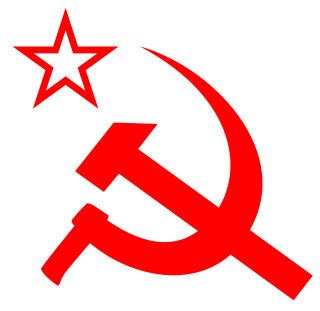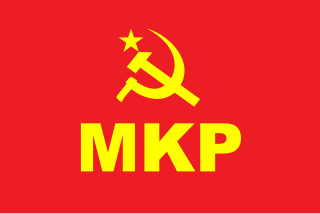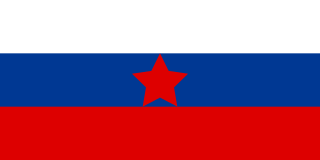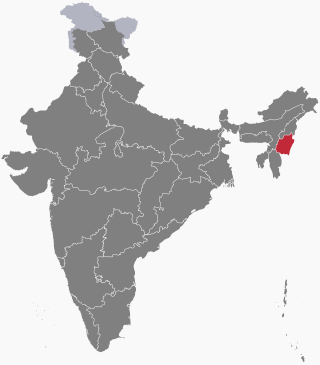The People's Liberation Army is the armed forces of the People's Republic of China. It may also refer to:
A resistance movement is an organized group of people that tries to resist the government or an occupying power, causing disruption and unrest in civil order and stability. Such a movement may seek to achieve its goals through either the use of violent or nonviolent resistance, or the use of force, whether armed or unarmed. In many cases, as for example in the United States during the American Revolution, or in Norway in the Second World War, a resistance movement may employ both violent and non-violent methods, usually operating under different organizations and acting in different phases or geographical areas within a country.
People's war or protracted people's war is a Maoist military strategy. First developed by the Chinese communist revolutionary leader Mao Zedong (1893–1976), the basic concept behind people's war is to maintain the support of the population and draw the enemy deep into the countryside where the population will bleed them dry through guerrilla warfare and eventually build up to mobile warfare. It was used by the Chinese communists against the Imperial Japanese Army in World War II, and by the Chinese Soviet Republic in the Chinese Civil War.

The Insurgency in Northeast India involves multiple separatist militant groups operating in some of India's northeastern states, which are connected to the rest of India by the Siliguri Corridor, a strip of land as narrow as 14.29 miles (23.00 km) wide.
People's Army/Armed Forces is/was the title of the armed forces or army of several countries:

Left-wing terrorism or far-left terrorism is terrorism motivated by left-wing or far-left ideologies, committed with the aim of overthrowing current capitalist systems and replacing them with communist or socialist societies. Left-wing terrorism can also occur within already socialist states as criminal action against the current ruling government.

The Communist Party of Turkey/Marxist–Leninist is a Marxist–Leninist–Maoist insurgent organization in Turkey involved in the Maoist military strategy of people's war against the Turkish government. It was founded in 1972 by a group of former members of the Revolutionary Workers and Peasants Party of Turkey (RWPPT), organised by İbrahim Kaypakkaya as TKP (M-L), who wished to carry out armed struggle.

The Maoist Communist Party of Turkey is a Marxist–Leninist–Maoist insurgent organization in Turkey. It is the most significant of the Maoist organisations in Turkey; it upholds the legacy of İbrahim Kaypakkaya. It maintains two armed wings: the People's Partisan Forces and People's Liberation Army . MKP was a part of Revolutionary Internationalist Movement and participated in the Conference of Communist and Workers' Parties of the Balkans.

The People's Liberation Army of Manipur, often shortened to the People's Liberation Army, is a militant group fighting for the creation of an independent and socialist Manipur, a state in northeastern India.
Secession in India typically refers to state secession, which is the withdrawal of one or more states from the Republic of India. Whereas, some have wanted a separate state, union territory or an autonomous administrative division within India. Many separatist movements exist with thousands of members, however, some have low local support and high voter participation in democratic elections. However, at the same time, demanding separate statehood within under the administration of Indian union from an existing state can lead to criminal charges under secession law in India. India is described as an ‘Union of States’ in Article 1 of the Indian constitution I.e "Indestructible nation of destructible states" by its father of constitution Dr. Bhimrao Ramji Ambedkar where a state or Union territory of India cannot secede from India by any means and the Central Government has more powers than the respective state governments and can forcefully change the names and boundaries of the states without their permission at any time when needed for self interest and for the maintenance of integrity.

The Slovene Partisans, formally the National Liberation Army and Partisan Detachments of Slovenia, were part of Europe's most effective anti-Nazi resistance movement led by Yugoslav revolutionary communists during World War II, the Yugoslav Partisans. Since a quarter of Slovene ethnic territory and approximately 327,000 out of total population of 1.3 million Slovenes were subjected to forced Italianization since the end of the First World War, the objective of the movement was the establishment of the state of Slovenes that would include the majority of Slovenes within a socialist Yugoslav federation in the postwar period.

The People's Liberation Guerrilla Army (PLGA) is the armed wing of the Communist Party of India (Maoist), a banned political organisation in India which aims to overthrow the Indian Government through protracted people's war.

Kangleipak Communist Party is a Maoist militant group in Manipur, India. Named after Kangleipak, the ancient name of Manipur, it was initially led by the communist ideologues — Ibohanbi and Ibopishak. The Kangleipak Communist Party (KCP) had been engaged in an armed conflict separatist insurgency in Manipur against the government of India.

The Maoist Communist Party of Manipur is a Maoist political party in Manipur which aims "to establish a communist society through armed revolutionary war." The Maoist Communist Party of Manipur also intends at liberating the people of Manipur from whom they view as "colonial India."
Marxism–Leninism–Maoism (MLM) is a political philosophy that synthesizes and builds upon Marxism–Leninism and the thought of Mao Zedong. Marxism–Leninism–Maoism was first formalized by the Shining Path in 1982.

The Insurgency in Manipur is an ongoing armed conflict between India and a number of separatist rebel groups, taking place in the state of Manipur. The Insurgency in Manipur is part of the wider Insurgency in Northeast India; it displays elements of a national liberation war as well as an ethnic conflict.

The Croatian Partisans, officially the National Liberation Movement in Croatia, were part of the anti-fascist National Liberational Movement in the Axis-occupied Yugoslavia which was the most effective anti-Nazi resistance movement. It was led by Yugoslav revolutionary communists during the World War II. NOP was under the leadership of the League of Communists of Yugoslavia (KPJ) and supported by many others, with Croatian Peasant Party members contributing to it significantly. NOP units were able to temporarily or permanently liberate large parts of Croatia from occupying forces. Based on the NOP, the Federal Republic of Croatia was founded as a constituent of the Democratic Federal Yugoslavia. British Prime Minister Winston Churchill referred to the movement as "the Croatian miracle".
A list of political party central committees: